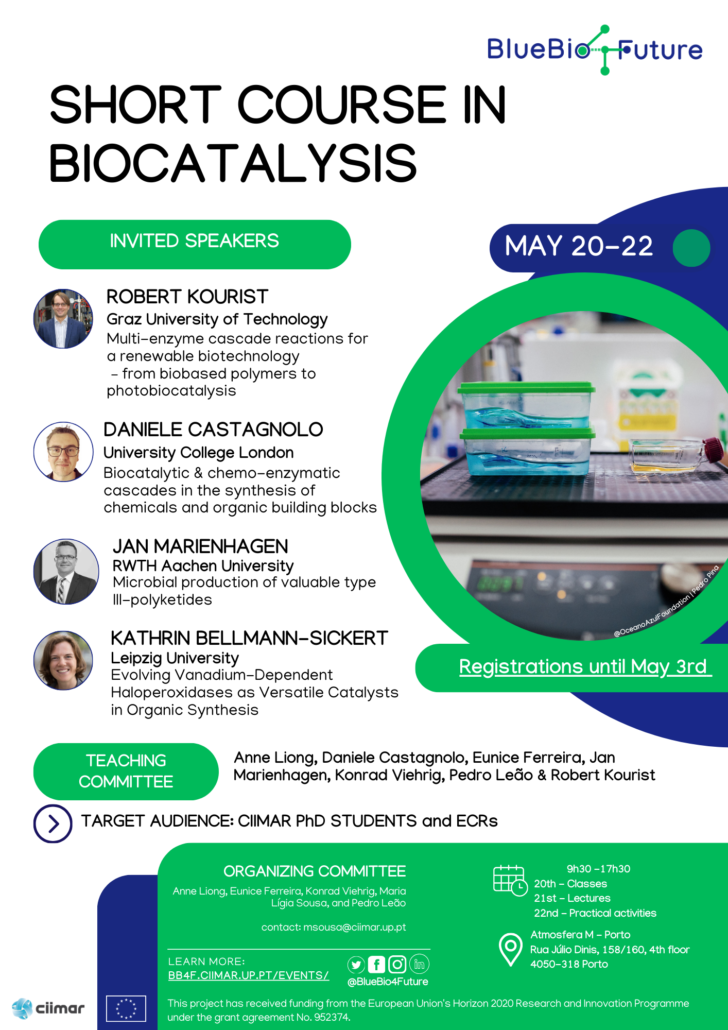BlueBio4Future Training Courses
20th May to 22nd May |
Atmosfera M – Porto
Rua Júlio Dinis, 158/160, 4th floor
4050-318 Porto
From May 20th to 22nd, the heart of Oporto City buzzed with scientific enthusiasm as CIIMAR hosted a transformative Short Course in Biocatalysis, an initiative of the BlueBio4Future ERA Chair. This intensive three-day program aimed to enhance knowledge and expertise in biocatalysis, an area currently underdeveloped at CIIMAR. The course was spearheaded by high-profile European researchers in the field:
Daniele Castagnolo, Associate Professor in Chemical Sustainability, Department of Chemistry, University College of London.
Robert Kourist, research team leader at the Cell and Protein Engineering Group, Institute of Molecular Biotechnology, Graz University of Technology.
Kathrin Bellmann Sickert, Research and Teaching Associate at University of Leipzig – Gulder Group.
Jan Marienhagen, Chair of Biotechnology at RWTH Aachen University and Group Leader of “Synthetic Cell Factories” at Research Centre Julich Institute of Bio- and Geosciences.
The success of this short course underscores ERA Chair’s commitment to advancing the expertise of its researchers in underdeveloped areas. The organizers and students alike felt a sense of pride in what was achieved over the three days. The positive feedback and the innovative project ideas generated during the course highlight the potential for significant advancements in biocatalysis research at CIIMAR.
We extend our heartfelt gratitude to all the invited speakers for their invaluable contributions. We sincerely hope to maintain this bond for future scientific endeavors.
Moving forward, the ERA Chair BlueBio4Future aims to continue elevating the knowledge and skills of CIIMAR researchers, contributing to the quality and impact of Portuguese research. The institute is dedicated to promoting sustainable scientific practices that can lead to a greener and brighter future.
Invited Speakers:
Robert Kourist research team leader at Cell and Protein Engineering Group – Institute of Molecular Biotechnology, Graz University of Technology
MULTI-ENZYME CASCADE REACTIONS FOR A RENEWABLE BIOTECHNOLOGY – FROM BIOBASED POLYMERS TO PHOTOBIOCATALYSIS
Cascade and one pot reactions represent an exciting and recent development in biocatalysis. There are, however, a range of technological and scientific challenges to be met en route to industrial scale. In this talk, I will focus on the coupling of biocatalysts to other catalysts in order to provide routes that would be difficult with the individual, separated reactions.
A first example presents the synthesis of biobased olefins as highly promising polymer precursors. The alpha-methylene lactone Tulipalin A has two polymerizable functional moieties and is a potential substitute of (meth)acrylates in vinyl-addition polymerization and (co)monomer for lactone ring-opening polymerization. While Tulipalin A can be isolated from, its biosynthesis remains unknown. A possible synthesis route starts from the microbial terpenoid metabolism. The key step of this pathway is catalyzed by a membrane-bound monooxygenase. Rational design of the activity of this this membrane-enzyme aiming based on de novo structure predictions will be presented.
A second example deals with the coupling of enzymes with photosynthetic water-splitting as means to provide electrons and oxygen for redox biotransformation. This approach greatly improves the atom economy of redox biotransformations and circumvents problems associated to the low mass-transfer of oxygen. Several examples demonstrated the feasibility of the approach with high selectivity and high reaction rates for several redox processes. The presentation will discuss strategies how to overcome current limitations and to improve the volumetric productivity by combining process design and metabolic engineering, and present a strategy towards clean redox biocatalysis in engineered autotrophic microorganisms.
Daniele Castagnolo is an Associate Professor in Chemical Sustainability at the Department of Chemistry at University College of London.
BIOCATALYTIC & CHEMO-ENZYMATIC CASCADES IN THE SYNTHESIS OF CHEMICALS AND ORGANIC BUILDING BLOCKS
Biocatalysis is the use of natural enzymes, as isolate entities or as whole cells, for the synthesis of non-natural organic compounds and it probably represents the greenest technology for the manufacturing of fine chemicals and pharmaceutical ingredients under mild and sustainable conditions. The number of small and large industries employing biocatalysts for the manufacturing of drugs and chemicals has exponentially increased in the last decade due to the advantages that enzymes intrinsically offer in terms of stereo-, chemo- and regio-selectivity. In addition, the possibility to combine biocatalysis with classical chemocatalytic methods in a concurrent fashion (chemo-enzymatic cascades) represents an intriguing challenge for chemists and biologists as it allows to outperform sequential transformations with a higher degree of selectivity. Chemo-enzymatic cascade reactions can offer multiple benefits such as the immediate succession of individual transformations and the in-situ consumption of toxic or unstable intermediates without the requirement of intermediate isolation or functional group protection strategies, thus leading to safer processes and to the reduction of undesired side products.
Our research group aims to develop greener, scalable and sustainable methodologies for the synthesis of chemicals and drug building blocks by replacing toxic and polluting reagents with enzymes, combining chemo- and biocatalysts in cascade reactions to avoid multiple purification steps and performing chemical reactions at mild temperatures and in the presence of benign solvents such water.
This presentation will focus on some of our recent works on the biocatalytic synthesis of heterocyclic compounds, chiral sulfur compounds bearing stereocentres at the C-S bond, and cyclopropanes, exploiting oxidoreductive enzymes. Biocatalytic reactions as well as chemo-enzymatic or multi-enzymatic cascade transformations leading to nitrogen heterocycles, enantiopure sulfoxides and hydroxysulfides and cyclopropanes will be presented.
Jan Marienhagen Chair of Biotechnology at RWTH Aachen University and Group leader of “Synthetic Cell Factories” at Research Centre Julich Institute of Bio- and Geosciences.
MICROBIAL PRODUCTION OF VALUABLE TYPE III-POLYKETIDES
Several thousand different type III-polyketides of which many have the potential to aid in preventing or treating cancer, cardiovascular, and neurodegenerative diseases are synthesized by plants and other organisms. However, plants in particular contain complex polyketide mixtures impeding access to individual compounds in larger quantities. In contrast, functional integration of biosynthetic pathways from higher organisms into microorganisms allows for the production of individual compounds, which can be more easily isolated. Over the last years, microbial synthesis of many (plant) polyketides could be achieved, and along the way, many decisive bottlenecks in the endogenous microbial host metabolism as well as in the heterologous pathways could be identified. In this talk, I want to show how we engineer microorganisms for the production of polyketides with a focus on polyphenols and I want to discuss how current challenges could be addressed in the future.
Kathrin Bellmann Sickert Research and Teaching Associate at University of Leipzig -Gulder Group
EVOLVING VANADIUM-DEPENDENT HALOPEROXIDASES AS VERSATILE CATALYSTS IN ORGANIC SYNTHESIS
Vanadate dependent haloperoxidases are oxidoreductases that introduce halogens into Csp2-containing substrates like alkenes and aromates by electrophilic addition or substitution, respectively. It is one of nature’s ways to functionalize these molecules under aqueous and mild conditions. Halogenations in organic chemistry, in contrast, are still amongst the most challenging reactions as the methods at hand lack selectivity, apply harsh conditions and often corrosive and non-atom economic halogen sources. Furthermore, halogenations often need to occur at an early stage in multi-step synthesis, as later on they might destroy already introduced scaffolds. Using haloperoxidases as biocatalysts would overcome these drawbacks. Among them, vanadate-dependent haloperoxidases have proven to work in a range of organic solvents mixed with buffer solutions and also can halogenate a large number of substrates. However, little is known about how these enzymes control halogen specificity and also a substrate binding site has not been found so far. In my presentation, I will illustrate recent advances in answering these challenging questions. Furthermore, I will show our latest research on developing VHPOs as biocatalysts applicable in an organic chemistry lab, especially in lab-on-a-chip technology. Students will get insights into how biocatalysis more and more influences classic organic chemistry.
The goal of BlueBio4Future training courses is to provide CIIMAR researchers with the latest advancements in biotechnological research, focusing on Green Chemistry/Biocatalysis, Synthetic Biology, Bioinformatics, and Bioprocesses/Bioreactors.
The upcoming course will focus on the important role of biocatalysis in modern chemistry, transforming how we approach synthesis and production methods. During this short course, participants will explore the complex coordination of enzymatic cascades, mastering the art of creating intricate molecules with greater efficiency and precision. By combining enzymatic and chemical reactions, attendees will discover new ways to access a diverse range of chemical compounds. Additionally, the course will investigate the use of microbial systems for sustainable manufacturing, tackling the obstacles involved in scaling up biocatalytic processes for industrial use.
During the three-day training, the participants will engage in teaching sessions focusing on the basics of biocatalysis.
The second day will feature guest speakers presenting their latest research and knowledge, allowing students to engage with them closely.
On the final day, students will participate in hands-on training activities to further challenge themselves.
Registration just for attendance on the 21st of May
Vacancies are limited.



